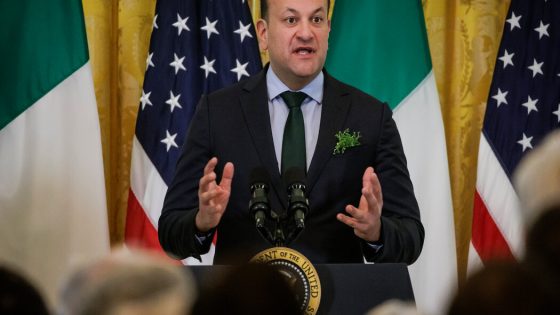Leo Varadkar, Ireland’s barrier-breaking taoiseach or prime minister, said on Wednesday that he would step down as the country’s leader, days after the defeat of two referendums that the coalition government had championed and after years of waning public support for his political party, Fine Gael.
Ireland is scheduled to hold a general election early next year, and his decision will not trigger an earlier election, he said.
“I know this will come as a surprise to many people and a disappointment to some, but I hope you will understand my decision,” Mr. Varadkar told a press briefing outside Leinster House in central Dublin. “I know that others will — how shall I put it? — cope with the news just fine,” he said. “That is the great thing about living in a democracy.”
Citing reasons both “personal and political,” Mr. Varadkar said he would step down from the party leadership effective immediately and would continue to serve as prime minister until his party elects a new leader. He said that would take place before a planned Easter break, with a new leader expected when the government returns on April 16.
He added, “Politicians are human beings, and we have our limitations.”
He made the unexpected announcement shortly after a cabinet meeting on Wednesday morning, his voice at times cracking with emotion.
There had been little indication of his decision just days earlier when he visited the White House and met with President Biden for St. Patrick’s Day. But his party has struggled in recent years, with the most votes in the 2020 election going to Sinn Féin — the party that has historically called for uniting Northern Ireland, which remains part of the United Kingdom, with the Republic of Ireland.
That was damaging to the longstanding dominance of Fine Gael and its rival, Fianna Fáil, pushing the two parties into a coalition government alongside the Green Party. And over the past two years, polls have suggested declining public support for Fine Gael.
Mr. Varadkar, who is gay and whose father is of Indian heritage, broke a number of barriers when he became the country’s youngest-ever leader in 2017.
After the coalition government came to power in June 2020, he served as deputy prime minister before again moving into the leadership role as part of the parties’ power-sharing agreement.
Much of Mr. Varadkar’s work since that time, and in the later half of his first premiership, focused on navigating a changing post-Brexit landscape that threatened to undermine the 1998 Good Friday Agreement that had forged decades of peace on the island of Ireland.
He was applauded for those efforts, and was seen as crucial to winning major concessions from Britain. That included his negotiating a deal with then Prime Minister Boris Johnson of Britain that avoided a hard border between the Irish Republic and Northern Ireland.
But Ireland has also been dealing with domestic issues, including a severe housing shortage caused in part by the failure of successive governments to invest in affordable housing and a cost-of-living crisis that has deepened deprivation. Homelessness has soared in recent years.
Amid a sharp rise in the number of asylum seekers arriving in the country, the government has also had to contend with a nascent but growing anti-immigration backlash that has increasingly spilled over into violence. Arsonists have targeted planned housing for asylum seekers, and a violent riot in Dublin late last year drew international attention.
The government most recently faced criticism for a failed campaign on two referendums that it had expected to win. This month, Irish voters rejected two proposed changes to the Constitution that would have removed language about women’s duties being in the home and broadened the definition of family beyond marriage.
Analysts said the results in part reflected a weak campaign for the amendments, confusion over the proposals and a lower-than-expected voter turnout that cast a spotlight on the government’s approach.
As he announced his resignation, Mr. Varadkar acknowledged that despite a number of successes, there were “other areas in which we have been much less successful and some in which we have gone backwards.” He said that he would “leave it to others to point them out on a day like this.”
“I know, inevitably, there will be speculation as to the ‘real reason’ for my decision,” he said during the announcement. “These are the real reasons. That’s it. I have nothing else lined up or in mind. No definite personal or political plans, but I am looking forward to having the time to think about them.”
Micheál Martin, the Fianna Fáil leader and deputy prime minister, said on Wednesday that he and Eamon Ryan, the Green Party leader, had been briefed on Tuesday night by Mr. Varadkar about his decision to step down.
“To be honest, I was surprised, obviously, when I heard what he was going to do, but I wanted to take the opportunity to thank him sincerely,” Mr. Martin said.
Mr. Martin said he felt confident that the government had a clear mandate and a clear program for moving forward. Mr. Ryan later told the national broadcaster, RTÉ, that he, too, had been surprised by the decision, but that he supported Mr. Varadkar’s choice.
“I think it’s for personal more than political reasons that he wants to step down,” Mr. Ryan said.
Source Agencies


